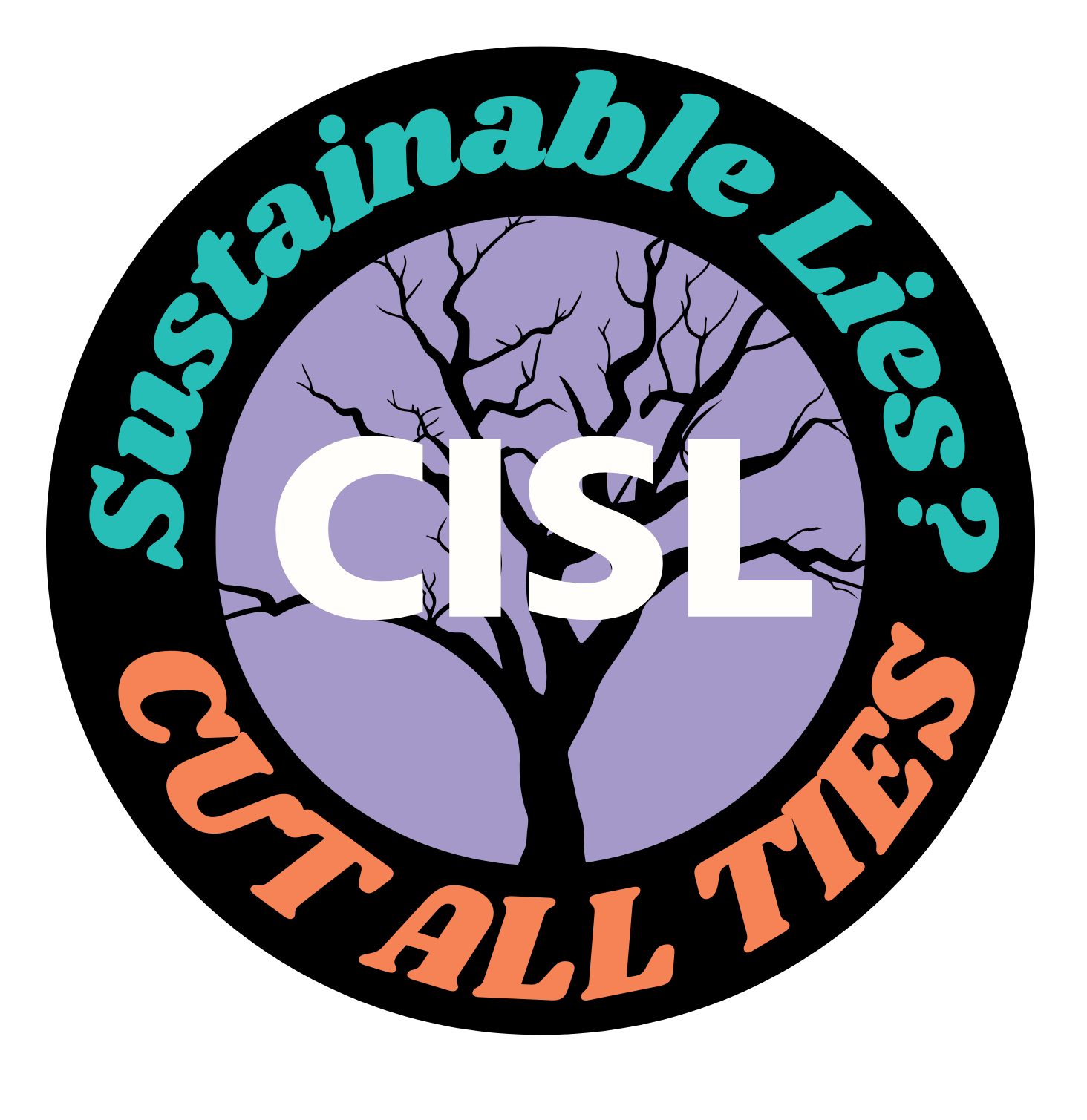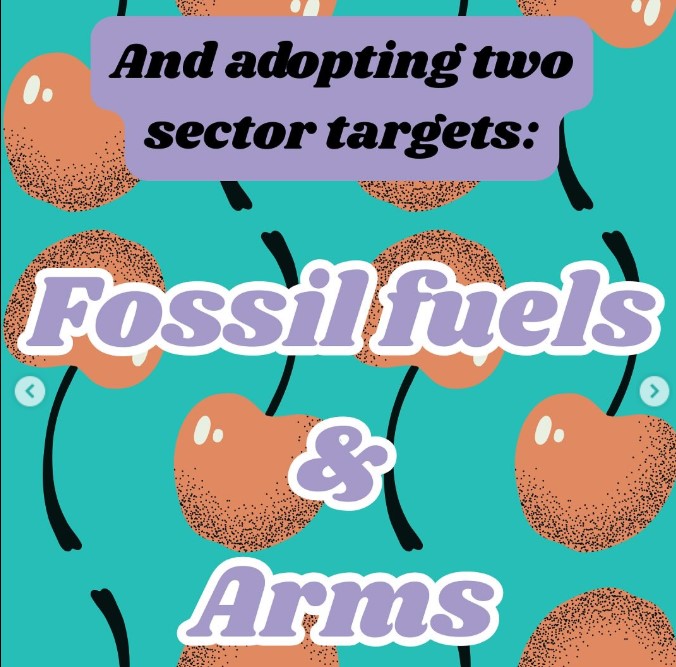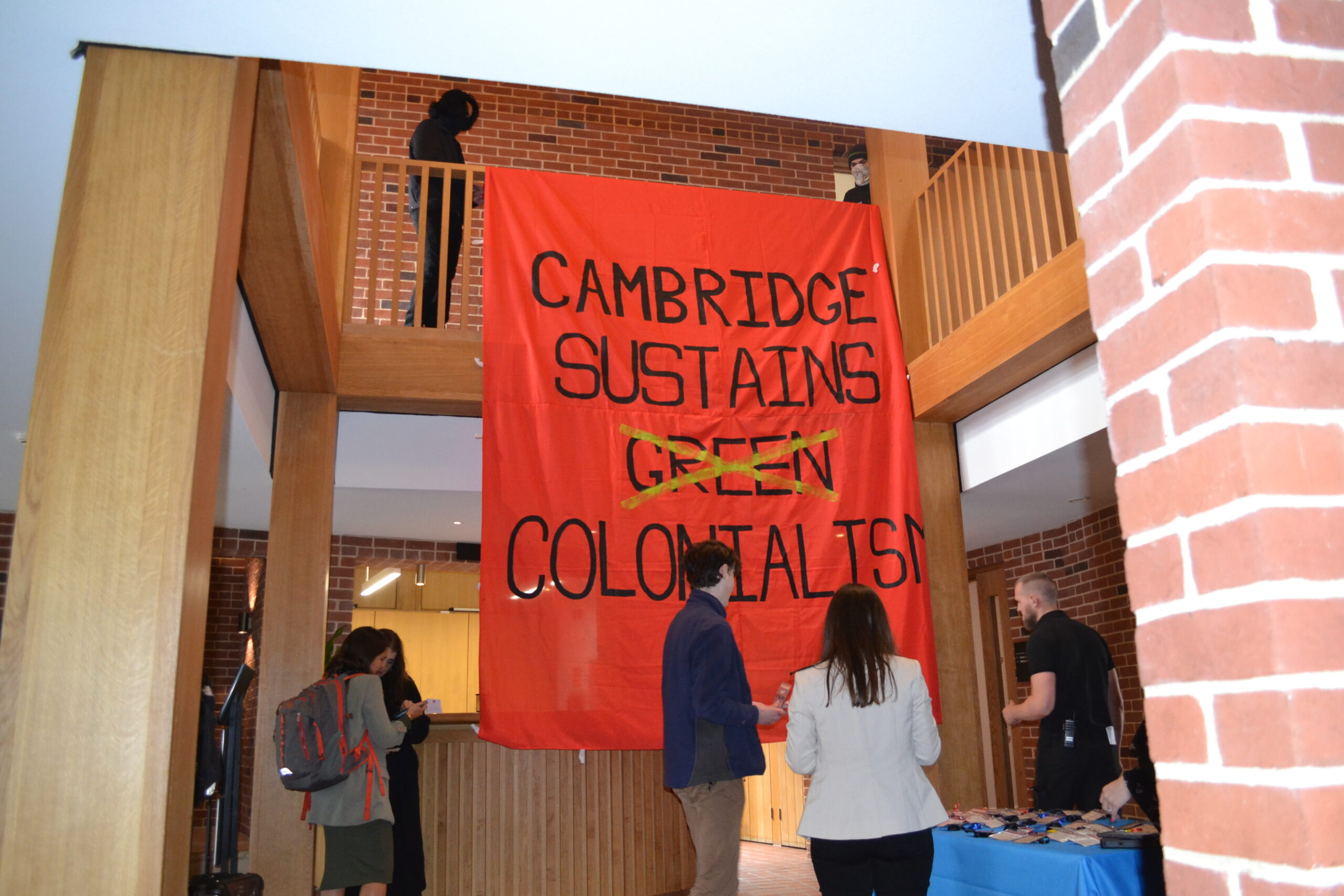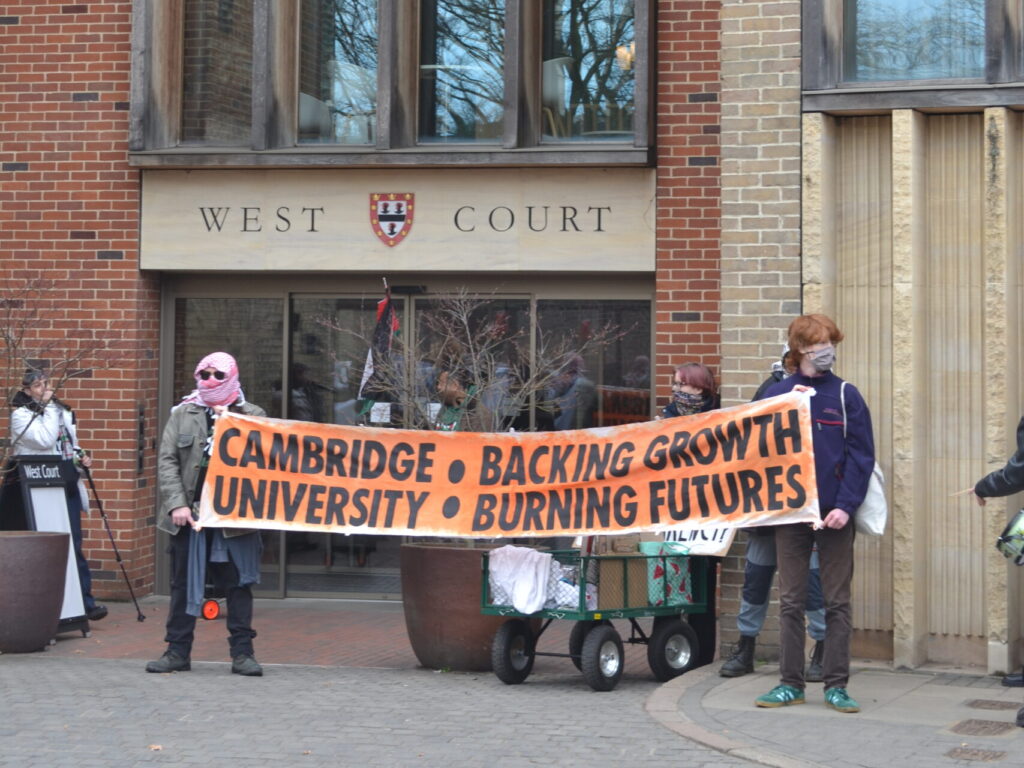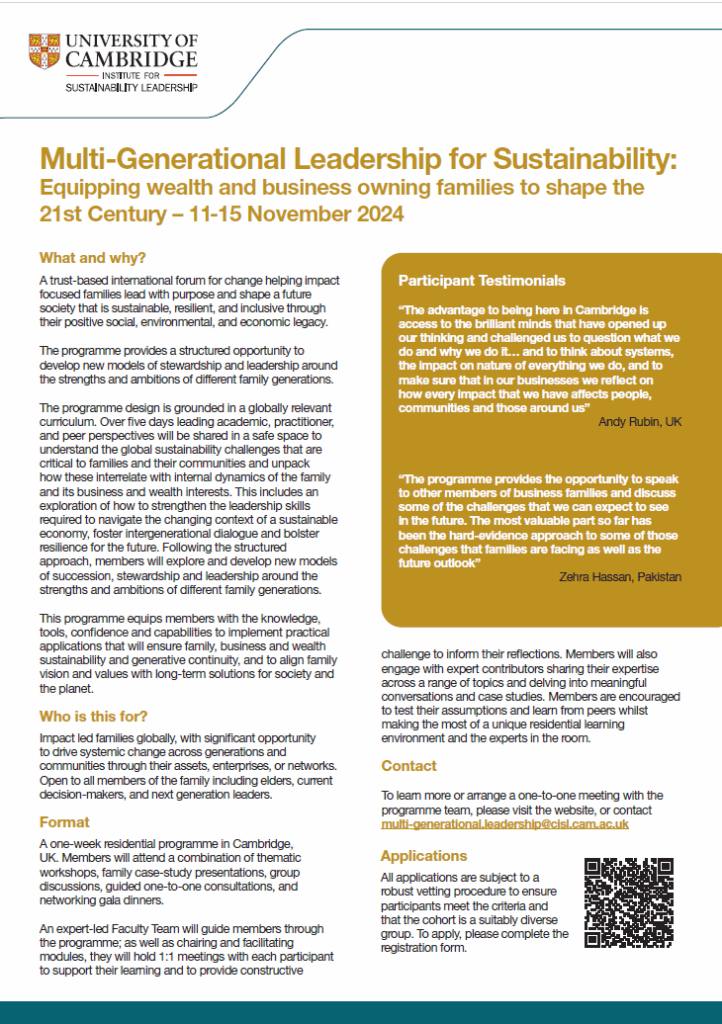Since we launched our CISL & Sustainable Lies campaign, we’ve had some contact with members of staff from the Cambridge Institute for Sustainability Leadership. We have decided to put the email chain online because we want to be transparent. We’ve removed names, and annotated in places.
From: CISL | Date: 01/04/2025
Notes: This was sent in response to our campaign announcement and an action directed toward CISL, UNEP-WCMC and Proteus Partnership, which took place on March 25th.
Hi there,
We’d like to invite you to come and chat with some of the CISL team in Cambridge so we can listen to your concerns, share our position and open constructive dialogue.
Please let me know who it would be best to organise this with.
All the best,
[name]
From: ORCA | Date: 07/04/2025
Hi [name],
Thanks so much for reaching out.
For sure we’d be happy to have a meeting, and I ([name]) am happy to organise this with you.
Obviously, open constructive dialogue is based on a shared base of facts, so we’d need to have a precise idea of what CISL’s ties with extractive companies, including our campaign targets Coca-Cola, Total, Axa, AngloAmerican and BP. Specifically we’d like to be clear on the financial relationships and the nature of groups they sit on.
Let me know how if you have any questions on the best format to send this information in,
Thank you,
[Name] for ORCA
From: CISL | Date: 09/04/2025
Notes: at around this time, CISL changed several pages on their website. At the point of the campaign launch, Total was listed as part of the Corporate Leader Group Africa, and BP as a partner in the Aviation Impact Initiative. Since this point, CISL have also changed the wording of their statement regarding working with fossil fuel companies. It is difficult to know the extent to which they have actually ceased working with these companies because of inconsistencies in their accounts, and also because of a complete refusal to be transparent on the education side of their work.
Hi [name],
I’m happy to share more information ahead of our meeting, especially to correct any misconceptions and to put us on a firmer footing for discussions.
CISL welcomes lawful civil society protest against an economy that is currently structured in ways that undermine rather than protect the social and environmental foundations on which we all depend. Indeed, we believe that effective civil society action to build broad momentum for change is needed now more than ever, as action to tackle sustainability challenges is under attack from those invested in the status quo.
We believe the crises of climate change, nature loss and inequality stem from economic structures and business models that externalise social and environmental costs, prioritise short-term profit over long-term value, and favour incumbent organisations with damaging business models. Too much corporate action over recent decades has been ineffective in addressing these challenges. This is something we have increasingly called out.
Our role is to work with business and government to go beyond these flawed approaches and drive market-wide change aligned with science, so that economies reward sustainability action while phasing out harmful activity. This often requires working with major business and financial institutions, as governments pay attention to their voices, and they have the capital and resources to deliver change at scale – but we only do so where there’s credible potential for wider market transformation.
As an institution that works with major figures in the economy – including businesses who need to change – we understand that sometimes protest will be aimed at us and we’re happy to listen and engage with any criticisms of our work, although we may not always agree with our critics.
We understand that you are keen to engage us directly on the organisations that we work with and we are happy to discuss who we work with, how and why, when we meet. However, we cannot always discuss our internal decision-making on individual clients. We do not work with oil companies and do not have any oil companies as members of our business groups. Here are links to our position on who we work with and, phase out of fossil fuels and our position on working with fossil fuel companies is at the end of this message. For now, we can confirm:
- All members of our leadership groups – and the terms of the group – are published on our website. Specifically in relation to the companies you listed:
- Axa is a member of our ClimateWise insurance initiative
- Coca Cola is a member of our Corporate Leaders Group – a group that has been effective in securing the UK’s legally binding Net Zero Commitments and the EU Green Deal and Nature Restoration Law
- Anglo American and Coca Cola are members of our Corporate Affairs Leadership Forum and Corporate Leadership Group in Africa
- We have no oil companies in our Corporate Leaders Groups (CLGs). The last, Shell, left the CLG in 2015 (see FT coverage at the time). We have never partnered with Total Energy (this was previously erroneously included on our website) and we do not work with Shell or BP.
- We do not as a matter of course disclose education clients as it is an internal company process with potential to drive change from the inside, but without publicity benefits.
In your wider campaign you have also highlighted a range of concerns, including about growth, capitalism, citizen engagement and COPs (among other things). We are happy to discuss these when we meet – but will leave it to you to indicate what you would like to discuss beyond who we work with.
In case it is useful to know where we are coming from before we talk, this report of a summit we convened last year (because we were concerned about lack of global progress) outlines our views on a range of topics, from governance and economics to citizen engagement. Specifically on global governance, we concluded: “Regarding the COP process specifically, leaders cannot afford to abandon it, in spite of its flaws. Going forward, they should make every effort to eliminate vested interests from influencing negotiations and guarantee space for inclusive, open debate.”
On capitalism, market-based approaches and flawed corporate approaches, this paper outlines our thinking, and we have just published a follow up report this week on how businesses can support ambitious policy action.
On working with fossil fuel companies, our full policy is below but, while we do not completely rule it out, we are committed to phasing out fossil fuels. We believe that history has shown that the industry is both poorly positioned for this transition and has obstructed rather than supported change. This is why we have no projects with dedicated fossil fuel companies and have not done for some time.
We look forward to meeting and further discussing your concerns.
I will join the meeting with our CEO, [name].
Please let me know if any of the times below work for you and share details of who will be joining.
I’m on leave from tomorrow / next week so please cc [name] into your response and she will share the meeting invite.
Thurs 24 April – 0900-1000
1000-1100
Fri 25 April – 0900-1000
Attached: CISL Policy – Working with Fossil Fuel companies
We believe that an urgent phase out of fossil fuels is required, and that most fossil fuel companies – particularly oil and gas companies – are poorly positioned for this transition and that many are obstructing the pace of change required to deliver global climate goals.
While we hope this will change, we do not prioritise work with fossil fuel companies on their transition plans. We believe the best use of our time and resources is to focus on accelerating business, government, finance and citizen action away from dependence on fossil fuels, and towards a net zero carbon energy system. CISL’s work – across our Foresight, Education, Convening and Innovation – therefore has a proactive focus on contributing to:
- Political and policy action, nationally and internationally, that will drive and enable the phase out of fossil fuels
- Shifting capital flows away from fossil fuels toward sustainable energy systems
- Fostering and scaling innovations that will enable transition in the necessary timeframe
- Work by business, government and financial institutions to inform and influence action by citizens and consumers to support transitions plans and policies.
- Developing the evidence base that can accelerate an energy transition towards a more sustainable future.
Where we do engage with fossil fuel companies we would only expect it to be in one of two situations:
- Working with a fossil fuel company on a project or programme that we believe will contribute to systemic change and where any such company had aligned its business plans, targets, lobbying and other activities with a fossil fuel phase out by 2050 in a way that can be evidenced and assured.
- Being involved in dialogues and discussions that include fossil fuel companies, both ones that CISL organises but also ones held by governments, international organisations and other actors which are focused on collaborative action across regions and sectors to achieve fossil fuel phase out. Where we have the remit and capability to, we will work to ensure the independence and integrity of such discussions.
From: ORCA | Date: 17/04/2025
Notes: one of our members made an error with the SBTi definition, and so some companies (but not all) are incorrectly included on the list below.
Dear [names],
We have some follow up questions in response to some of the information and claims you have shared.
Nature of Partnerships
Firstly, what does it mean for a company to be a member of ClimateWise or a Corporate Leader Group? Specifically:
- How much do companies pay for membership?
- What is promised to companies in return?
We note that you justify non-transparency regarding “education clients” on the basis that this provides no “publicity benefits”. Please could you explain more about the publicity benefits of ClimateWise and the CLGs? Further, can you explain if that means that the standards you apply to CLG members do not apply to education clients?
Ethical Standards
We find it surprising to hear that you welcome protest while you continue to partner with companies (e.g. Coca Cola) that commit violence against environmental and land rights activists. We also notice that you advertise ties to organisations such as Boeing, Rolls Royce and the British Army. We would be keen to know whether you have any ethical guidelines relating to weapons and armed violence, as this seems quite a glaring omission from the “Who we work with” page you attached in your email. Beyond this, we would be interested in information on partnership ethical standards relating to the following:
- Water, land, air and plastic pollution
- Free prior and informed consent for indigenous and local peoples
- The use of investor-state dispute settlements
Additionally, we’d like to know if you have regulations regarding the lobbying records of the companies you work with, in line with broader university policy (https://www.admin.cam.ac.uk/reporter/2020-21/weekly/6590/section1.shtml#heading2-7)? We note the poor LobbyMap ratings of some CISL-linked companies, such as Dow, AngloAmerican and Teck (https://lobbymap.org/LobbyMapScores).
Fossil Fuel companies
We were pleased to see that you have changed your policy regarding working with fossil fuel companies. With that in mind, we have several questions.
As of 12th April, BP is listed on CISL’s website as being involved in the Aviation Impact Accelerator project, which is led by CISL. This is in contradiction with your statement above that CISL does not work with BP, or any fossil fuel companies. Is BP still involved in AIA? We note that they were invited to the opening of the Entopia building in 2022 with significant fanfare. Have you since made the decision to sever ties?
There are several other companies listed on your website that seem to meet the SBTi definition of fossil fuel companies you adopt, according to the Global Energy Monitor. We’d be interested to know the nature of your connections with them – in particular, whether you will be ending your work with them in response to your apparent policy change. They are:
- Engie (CLG Chile)
- Enel (CLG Chile)
- SSE (CLG UK)
- National Grid (CLG Europe)
- Iberdrola (CLG Europe)
- Colbun (CLG Chile)
- EDF (CLG UK and Europe)
- Teck (CLG Chile)
- South32 (CLG Africa)
- Dow (CLG Africa)
- Tata (Prince of Wales Business and Sustainability Programme)
- LaFarge (CLG Africa)
- P&G (Prince of Wales Business and Sustainability Programme)
- Petronas (Prince of Wales Business and Sustainability Programme)
- Beach Energy (Prince of Wales Business and Sustainability Programme)
- Curragh Queensland Mining Company (Prince of Wales Business and Sustainability Programme)
- Petroleum Development Oman (Prince of Wales Business and Sustainability Programme)
- AngloAmerican (CLG Africa, Prince of Wales Business and Sustainability Programme)
- Siemens Energy (Aviation Impact Accelerator Programme)
Given inconsistencies between your policy and public messaging, you will not be surprised to learn we’re sceptical about the “erroneous” inclusion of Total on your website. Can you explain how exactly you came to list Total on your website, complete with logo and a link to their website? Are you suggesting that Total have not at any point been involved in CLG Africa or the Sustainability Leadership Forum in Kenya?
Ultimately, we believe that CISL needs to be accountable to the communities you are complicit in harming, rather than to us in private email chains and closed door meetings. A public statement outlining your ties to Total Energy, BP and other fossil fuel, mining and energy companies would be a step towards this necessary and overdue transparency.
We look forward to hearing your answers to our questions, and then we can sort a time to meet.
[name]
From: CISL | Date: 24/04/2025
Note: this email fails to address most of our questions. Specifically, we want to highlight the evasion of questions regarding fossil fuel companies in education partnerships. We are also confused about the relationship with CLG Chile, which while perhaps not identical in format to the other CLGs remains part of a wider entity called the Corporate Leaders Network. We would also like to note that some of our members discussed the Entopia opening with CISL in a meeting a couple of years ago. In this meeting, CISL did not deny that BP had been present.
Dear [name],
Thank you for your message. We’re happy to discuss your concerns if we meet. We suggested meeting partly because we have published a lot of material over our 30-year history which is sometimes hard to navigate but would be easier to explain. In any case we agree with you that long exchanges of emails is not particularly helpful, but let us try to answer your questions.
- Nature of Partnerships/ Standards: The terms of reference for all CISL convened groups are published on our website, along with the lists of members. Different groups have different requirements, but for example our policy engagement groups require companies to be committed to responsible policy engagement. This is one reason why for example our Corporate Leaders Groups are A-rated by InfluenceMap. We believe that education has an important role to play in enabling companies to see why systemic change is necessary and inevitable and why it is in their interests to drive economy wide change. We are therefore willing to consider educating any company where we believe the genuine potential for change exists, irrespective of where they currently are on their sustainability journey. We exclude any potential clients where we believe they are engaging for reputational reasons only (and have contractual clauses to manage publicity). We don’t believe that oil and gas majors have any realistic prospect of transitioning and therefore screen them out.
- Fossil Fuel companies: We are involved in business collaborations and dialogues, and sometimes fossil fuel companies are part of this. So, Total were part of an initial open roundtable in Africa, and BP contributed insight and data to the Aviation Impact Accelerator models of the aviation sector. We have no funding from either company and would not include them in the groups we directly run. No fossil fuel company attended the opening of Entopia in 2022, although there were other events on the same day. Most of the companies you go on to list would not be included in the SBTi definition of a fossil fuel company (which, for example, does not include power companies, or energy equipment companies that are not focused on supplying the fossil fuel sector). However, the debate about who to work with and where to draw the line is a live and important one for us. For reference CLG Chile is not run by us or under our control – it was inspired by our work and we have shared ideas and support, but it is run by a local Chilean organisation.
Beyond this we think that if you do want to engage with us it might be more helpful to focus on the principles you are arguing rather than specific cases you are using to exemplify them. If we do not agree at the level of principles then we would waste time discussing cases.
If you do not wish to meet, however, we completely understand your position, but the offer remains open.
From: CISL | Date: 01/05/2025
Hi [name],
We’re aware that you plan to protest at the Entopia Building on Thurs 8 May and are happy for you to be present whilst being respectful to our property and staff. Our invitation to meet remains open if you wish.
All the best
From: ORCA | Date: 07/05/2025
Dear [names],
Thank you for your email. A couple of years ago, some of our members joined others from Demilitarise Cambridge and the students’ union in a meeting with CISL. I mention this for two reasons. Firstly, to flag that CISL’s account regarding BP’s presence at the Entopia opening seems to have changed since then. Secondly, to highlight that we have heard CISL’s account of your purpose and literature before, and didn’t find it persuasive.
As you suggest, we are more interested in “specific cases” – that is, the companies with whose activities you’re complicit – than with your literary works. We found your most recent email evasive – in line with the rest of this email thread, you have failed to answer most of our questions. Because of this, we don’t think it’s possible to have an open and constructive discussion. Specifically, we note with deep concern your complete refusal to engage on the questions of complicity in arms and genocide. With that in mind, we concur our principles do not align with yours. We would be happy to meet if at some point in the future you become willing to engage on the questions of what you do, rather than what you say.
Thank you also for your email regarding our protest tomorrow. As you are aware, this is not something we need or seek your permission to do.
Best,
[name]







